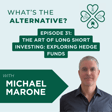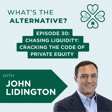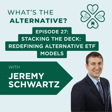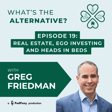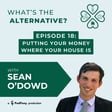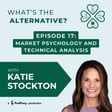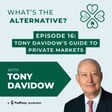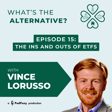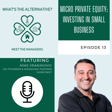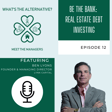
What's the Alternative? | Episode 8 | To Be or Not to Be Liquid (in Real Estate) Featuring Phil Bak
Welcome to Banrion Capital Management’s What’s the Alternative Podcast! Join host Shana Orczyk Sissel, the “Queen of Alternatives” Founder & CEO of Banrion Capital Management, as she interviews leaders in the alternative investment space. Learn more about their firms, their passions and about the many different ways investors can use alternative investments to add value in their investment portfolios.
In this episode Shana sits down with Phil Bak, CEO of Armada ETFs, REIT-specialty asset manager that delivers customized solutions to REIT investors through ETFs, SMAs, and access to proprietary AI and machine learning REIT valuation models.
Phil has been innovating in the ETF industry for over 15 years. He has previously served as Founder/CEO of Exponential ETFs, an ETF issuer and sub-advisor acquired by Tidal ETF Services in 2020. Phil has also served as Chief Investment Officer at Signal Advisors, a venture-backed startup in Detroit and Managing Director at the New York Stock Exchange where he worked on market structure enhancements, ETF listing rule changes, market maker incentive programs, and helping with asset managers launch ETFs. Prior to that Phil held product development roles where he developed and launched the first ever mixed-asset ETF, the first ever carbon-credit ETF, and patented the use of a controlled foreign corporation inside a ’33 act ETP.
Phil is also a Board Advisor of Civex, a startup platform bringing investor advocacy to retail investors, and Principal of Exponential Indexes. Phil is a graduate of Yeshiva University, is a Chartered Alternative Investment Analyst (CAIA), host of two podcasts (The ETF Experience and the Phil Bak Podcast), and an author who has been published on Yahoo Finance, TheStreet, Think Advisor, Seeking Alpha and regularly on Substack. Phil has been featured in top-tier media outlets such as the Wall Street Journal, Bloomberg, CNBC and Financial Times.
Learn More About Armada ETFs: Armada ETF Advisors
Connect with Armada ETFs on 𝕏: @armadaetfs
Connect with Phil on 𝕏: @philbak1
Connect with Phil on LinkedIn: Phil Bak
Check out The Phil Bak Podcast: The Phil Bak Podcast
Check out Phil's Substack: BakStack
Learn More About Banrion: Banrion Capital Management
Connect with Banrion on 𝕏: @Banrion_Capital
Connect with Shana on LinkedIn: Shana Orczyk Sissel
Connect with Shana on 𝕏: @shanas621
If you are an advisor wanting to check out our platform, we want to hear your feedback!
Important Disclosures:
The opinions expressed on the “What’s the Alternative Podcast” are for general informational purposes only and are not intended to provide specific advice or recommendations for any individual or on any specific security.
It is only intended to provide education about the financial industry. To determine which investments may be appropriate for you, consult your financial advisor prior to investing. Any past performance discussed during this program is no guarantee of future results.
The guests featured on
